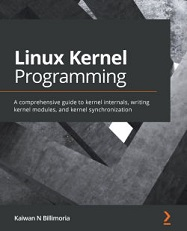Linux Kernel Programming a Comprehensive Guide to Kernel Internals Writing Kernel Modules and Kernel Synchronization
Material type: TextLanguage: English Publication details: Birmingham : Packt Publishing, c2021Description: XI, 734 P. : illISBN:
TextLanguage: English Publication details: Birmingham : Packt Publishing, c2021Description: XI, 734 P. : illISBN: - 9781789953435
- 005.432 BIL
| Item type | Current library | Collection | Shelving location | Call number | Copy number | Status | Date due | Barcode |
|---|---|---|---|---|---|---|---|---|
 Lending Collection
Lending Collection
|
Circulation Section | Department of Computer & Information Systems Engineering | Circulation Section | 005.432 BIL | 2022-23 | Available | 98025 |
Summary:
Learn how to write high-quality kernel module code, solve common Linux kernel programming issues, and understand the fundamentals of Linux kernel internals
Key Features
Discover how to write kernel code using the Loadable Kernel Module framework
Explore industry-grade techniques to perform efficient memory allocation and data synchronization within the kernel
Understand the essentials of key internals topics such as kernel architecture, memory management, CPU scheduling, and kernel synchronization
Book Description
Linux Kernel Programming is a comprehensive introduction for those new to Linux kernel and module development. This easy-to-follow guide will have you up and running with writing kernel code in next-to-no time. This book uses the latest 5.4 Long-Term Support (LTS) Linux kernel, which will be maintained from November 2019 through to December 2025. By working with the 5.4 LTS kernel throughout the book, you can be confident that your knowledge will continue to be valid for years to come.
You'll start the journey by learning how to build the kernel from the source. Next, you'll write your first kernel module using the powerful Loadable Kernel Module (LKM) framework. The following chapters will cover key kernel internals topics including Linux kernel architecture, memory management, and CPU scheduling.
During the course of this book, you'll delve into the fairly complex topic of concurrency within the kernel, understand the issues it can cause, and learn how they can be addressed with various locking technologies (mutexes, spinlocks, atomic, and refcount operators). You'll also benefit from more advanced material on cache effects, a primer on lock-free techniques within the kernel, deadlock avoidance (with lockdep), and kernel lock debugging techniques.
By the end of this kernel book, you'll have a detailed understanding of the fundamentals of writing Linux kernel module code for real-world projects and products.
What you will learn
Write high-quality modular kernel code (LKM framework) for 5.x kernels
Configure and build a kernel from source
Explore the Linux kernel architecture
Get to grips with key internals regarding memory management within the kernel
Understand and work with various dynamic kernel memory alloc/dealloc APIs
Discover key internals aspects regarding CPU scheduling within the kernel
Gain an understanding of kernel concurrency issues
Find out how to work with key kernel synchronization primitives
Who this book is for
This book is for Linux programmers beginning to find their way with Linux kernel development. If you're a Linux kernel and driver developer looking to overcome frequent and common kernel development issues, or understand kernel intervals, you'll find plenty of useful information.
You'll need a solid foundation of Linux CLI and C programming before you can jump in.
